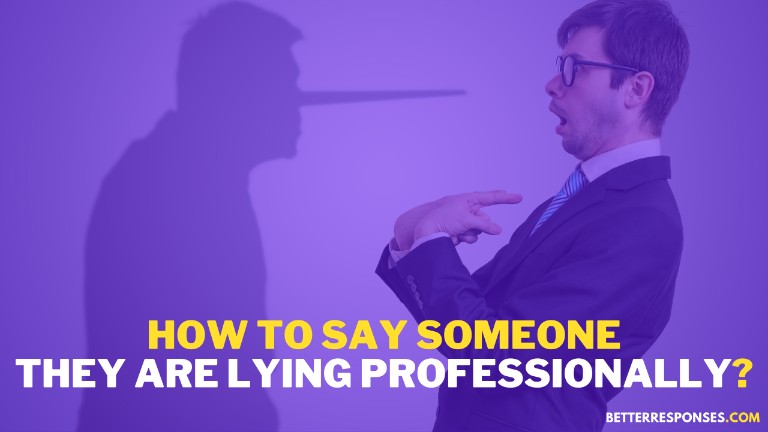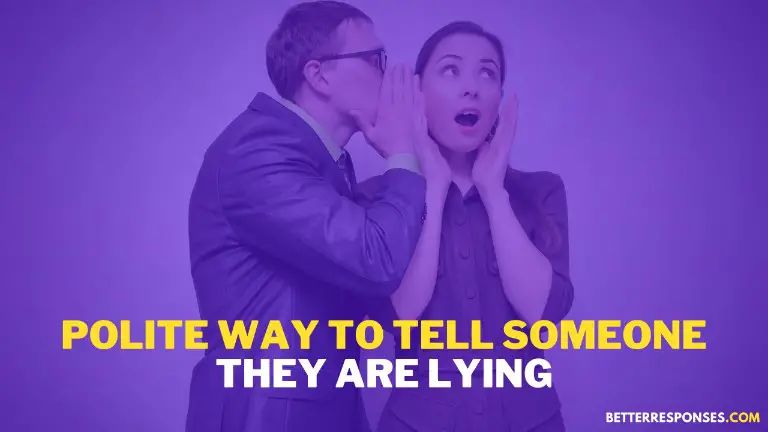Last Updated on February 9, 2024 by Ketan
Somehow, you find out that someone is lying to you at work.
If you confront them, they won’t admit it.
Possibly this leads to an argument there.
Well, there’s a way to deal with the lies (and false information) presented by your formal connection.
And, this article covers some professional ways to tell someone that they are lying without calling them a liar or cheat.
How To Say Someone Is Lying Professionally?
When you don’t believe your formal connection or their information, it’s not easy to be so direct about it.
Possible that calling them ‘liars or ‘dishonest’ is not going to help.
You want to make it polite.
Just so it doesn’t sound like an argument that could damage the office environment also your work connection.
Whether it’s your boss, manager, employees, or even clients when someone at work is lying to you, this is what you can say next.

1. “You might have a point, but having proof to back it up is quite important.”
What they suggest or say, you can’t relate with it.
Because you don’t see any proof or evidence to support it.
So this is also an excuse for not following them.
2. “I think this is a good idea, but better if we keep it for another time.”
You found that the information they provided is false and not accurate.
To waste no more time on an argument, this is enough to tell them.
READ NEXT: How To Reply To Compliments At Work Formally?
3. “Can you please share information to support your statement?”
Show that at some point you are not relating and so you need some validation.
A clear and direct approach to say that you need proof, without calling them a liar.
4. “Before I begin processing, please confirm that all these details are accurate.”
This approach gives them a chance who seems to be hiding some information.
You ask for their confirmation to decide what they believe about their information.
5. “Let me be honest with you, and tell you that I don’t think this will work.”
Because you know that they are lying and have no proof to support their proposal.
So you tell them that you don’t believe their plan or suggestion.
That you need another suggestion or new proposal from them.
6. “Well, I find it quite hard to believe. Please, can you explain it in more detail?”
You can’t work on the data or information that is based on guesses.
So, you tell your employee or coworker to provide you with more detail and explain the case briefly.
This is a better approach than calling your employees or workers liars.
7. “I don’t know anything about it. So, it’s better if I stay away from this.”
You don’t want to be part of their lies.
And so you make it very clear that you have no idea, what these coworkers are up to.
But you already know they are lying about something.
8. “It would be better if you provided more details to explain this in more detail.”
What you notice is that something isn’t as accurate or perfect as it should be.
You are allowing them to resolve their mistake if they have lied unintentionally.
9. “As per my knowledge, this isn’t what you promised in our earlier meeting.”
This is a formal response to show that their past statement and promises don’t match the results they are sharing now.
10. “Thank you for the information, but I’m having some trouble relating to your point.”
Your main trouble is that customer who is hiding some information with you.
But being polite you tell them that you can’t relate with what they say to you.

11. “Based on my resources, results are quite different than what you are stating.”
Remind them of the guarantee they have provided, but the results are far different than that.
READ NEXT: Best Answers To ‘Can You Guarantee It?’
12. “I’m interested to know how you come up with this.”
You are in doubt that they have fabricated some information or covering up.
So you tell them to provide the validation to support their statement or report.
13. “You must be joking with me, Right?”
This is a friendly approach to tell your coworker who is lying and you know it.
Or maybe when they suggest something to do, which is not usual, this is the way to verify before following them.
14. “I appreciate your feedback and concern on it. And, I also need to know what others are saying about this case.”
You suspect that in your team that employee is lying and trying to trick you.
Whether it’s related to handling internal conflicts or the accusations they made about others, you have to make the decision considering everyone’s experiences and opinions.
It might be too early to call someone a liar without knowing much about it.
15. “I think that’s enough information. I will update you on this after some fact-checking.”
Instead of accusing the client of lying, you tell them that you need some time to verify their details.
You could also say ‘I will get back to you’, to do some research yourself.
16. “I hope you are well aware of how important it is to be honest in this situation.”
This is a polite approach to asking for validation from someone lying at work.
You are giving them a chance to correct their information or statement.
And you hope that they will confess that themselves.
17. “Thanks for the suggestion. But let me know, how sure are you about this?”
Their suggestions or recommendations don’t seem credible to you.
So you tell them to revisit their plan and check if this is workable or not.
18. “I hope that you know the urgency of this situation and that you are taking full responsibility for it.”
When you tell them that they are responsible for the results, they are more likely to accept that they are lying.
If not then, they take more time to correct the false information.
READ NEXT: Formal Replies To ‘See You Soon’ At Work
When You Know SomeoneIs Lying At Work
Well, your boss, teammates or customer might have reason(s) to lie to you.
Depending on the situation, it could be good or bad.
But directly saying you don’t believe or trust them, is feeling like you calling them a liar.
You want to avoid that., a polite approach is a way to do it.

Whether you know their reason or not, you have to be mindful of handling their lies.
All that without creating a big drama at work.
Hopefully, the shared polite approach is better than directly telling ‘You’re lying’ to them.
Also, this gives them a chance to correct their information and behavior.
- 16 Better Replies To “We Should Talk More” - July 24, 2024
- 134 (Witty &) Flirty Answers To “Why Do You Love Me?” - July 24, 2024
- 27 Best Responses To “How Was Your Day?” - June 11, 2025


